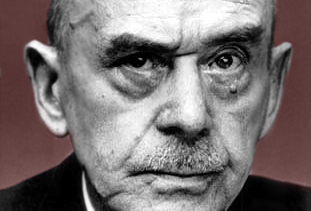
Both Thomas Mann and critic Erich von Kahler privileged the spiritual rather than political questions that rose out of post-WWII Europe. Von Kahler’s essays often begin in consideration of moral questions, and he is best known for his humanist theory of historiography. Here, Mann writes to Kahler after reading his review of Mann’s Doctor Faustus. That Kahler supported Mann’s retelling of Goethe’s classic work should not be taken lightly, as he considered the story to be the best description of the modern condition: “Unless we achieve a human community, all the rest of our achievements will turn out to be a pact with the devil.”
To Erich von Kahler
March 1948
Dear, good friend:
I can’t tell you, or can tell you only with awkward brevity, how your essay has moved and pleased me. A few days ago I broke my shoulder bone in a clumsy fall at someone’s house, and I am still all bandaged. For the first few days I was pretty miserable, but now it’s not so bad.
Your essay is the first discussion of the book that goes far beyond the ordinary reviews, a study written from a high vantage point of philosophical criticism that takes in my whole life and life work, with remarkable perception of its unity. Honoring the work, it also honors the life, not only on a moral basis, as effort, but as an existence guided and shaped by an inner “daimon.” So naturally I find your essay deeply gratifying and feel thankful for so much intelligent friendship and insight.
After having read the essay twice in this form, I look forward with pleasure to seeing it again in print. What stirred me most, perhaps, were the things you said about the almost savage directness of the book. That directness kept exciting me all along, and even now makes me feel as if the novel were still my own secret. It startles me that you use the word “montage,” for in my own mind I have used it frequently, and the idea of montage is in fact one of the premises of the book. One might almost think that the final paragraph directed against certain simple-minded notions regarding my comfort and safety strikes a banal note compared with all that comes before. But in the final analysis, it is by no means a bad idea to set that matter straight, both for the Germans and for the people like Döblin.
Note: Alfred Döblin was German modernist author best known for Berlin Alexanderplatz, a definitive work on the modern metropolis and its discontents. Despite the sleight in the letter above, Mann was a staunch supporter of Döblin, providing both fiscal and political support until Döblin’s death in 1957.
From Letters of Thomas Mann: 1889-1955. Translated by Richard and Clara Winston. New York: Knopf (1971) p. 549.
FURTHER READING
Thomas Mann’s obituary, commemorating much of his canon-worthy work.
A short review of Mann’s Dr. Faustus when it first appeared in English translation in 1975.


